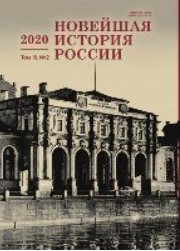Н. Н. Глебов-Путиловский — рабочий-вожак в годы Великой российской революции 1917–1922 годов
Nikolay Glebov-Putilovskiy. Worker and Leader during the Russian Revolution of 1917
Author(s): V. S. Izmozik, Alexander Evgenievich RabinowitchSubject(s): Political history, Labor relations, Government/Political systems, Political behavior, Pre-WW I & WW I (1900 -1919)
Published by: Издательство Исторического факультета СПбГУ
Keywords: Petrosoviet; Putilovsky Factory; United Workers Party; revolution; Russia; repression; great terror;
Summary/Abstract: The article describes the fate of Nikolay Glebov Putilovskiy, a skilled worker who became a member of the Social Democratic party at 19. A person of many talents (propensity for music, painting, political writing), aGlebov spent many years agitating for the unity of the workers’ movement and the development of the workers’ conscious autonomy. After ten years of forced emigration, Glebov returned to Petrograd in 1917 and, under the name N. N. Glebov-Putilovsky, became one of the most influential worker leaders at the Putilov Factory. In March 1918, he established the United Workers’ Party, which became a popular political movement among the factory’s workers. In the Russian Civil War, the UWP campaigned to fight against “the rule of commissars” and for the unification of “all sensible socialist forces” and free soviets. In June 1920, UWP announced its dissolution and assimilation by the Russian Communist Party of Bolsheviks (RCPb). Although Glebov was not accepted into the party, he held several high-level positions: editor of Lenoblizdat, head of the Anti-Religious Museum, deputy head of education at the Leningrad Institute of Painting, Sculpture and Architecture. His opinion was valued by the renowned artist P. N. Filonov. In 1938, N. N. Glebov was arrested and died in custody.
Journal: Новейшая история России
- Issue Year: 10/2020
- Issue No: 31
- Page Range: 381-397
- Page Count: 17
- Language: Russian

